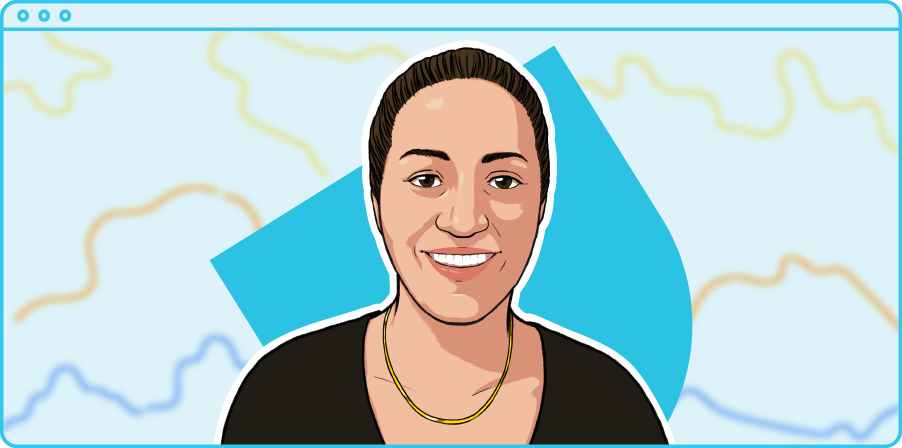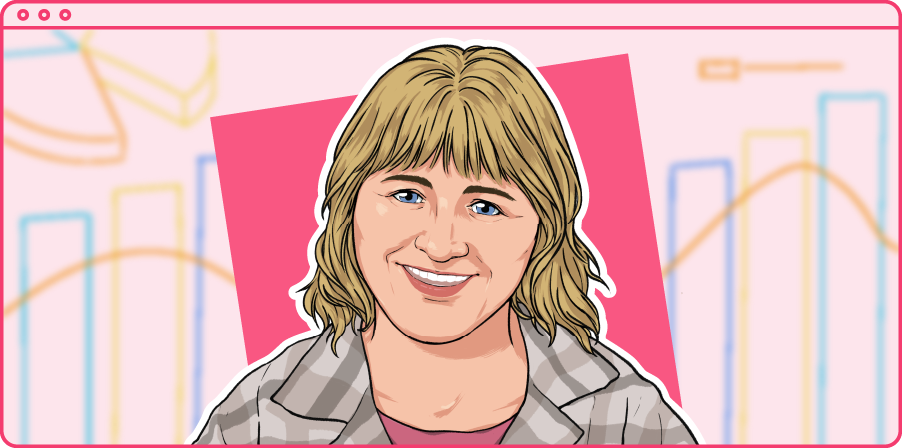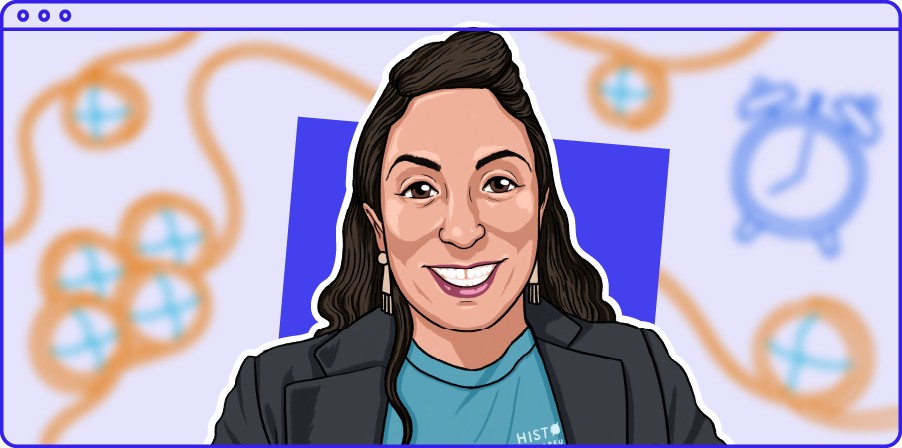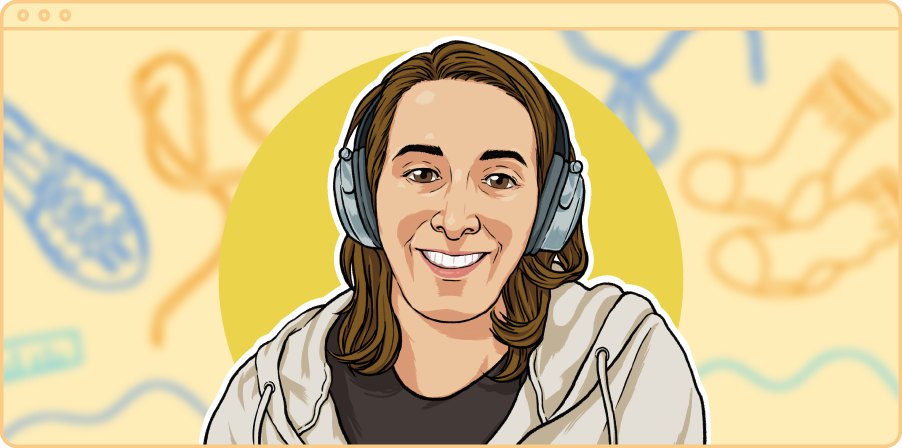Jessica Knox is the owner and CEO at Metrix. Metrix is a 30-year old agency that has its roots in learning, training, and development. Today, they apply their strategy and design capabilities across marketing, communications, and learning, with a focus on the pharmaceutical industry. They have also piloted a virtual career coaching service called Huugo.
In this interview, Jessica talks about the process of buying an established company from the founder, and how the company innovates its offerings as a well-established firm.
WORKOMICS: Can you start by summing up what Metrix is and what makes your company special?
Jessica Knox: Metrix is focused on improving people’s lives at work, through learning. We mostly help larger organizations, working with them to design training programs that will help their employees with performance, mindsets, skills, and behaviours. That can be anything from onboarding, to implementing a new system, to selling a new product.
Lately, we’ve had clients approach us about working on more marketing and communications projects, so we’ve been organically building up a new offering in that area. We’ve also been investing in more off-the-shelf programs for career development. What makes us special? I think we really stay attuned to what’s happening in the industry, and we believe in great design. We can really move the needle in terms of great learning experiences, and clients definitely appreciate that. We also have custom in our DNA. We really take the time to get to know each client’s unique needs and make something that will really work for them.
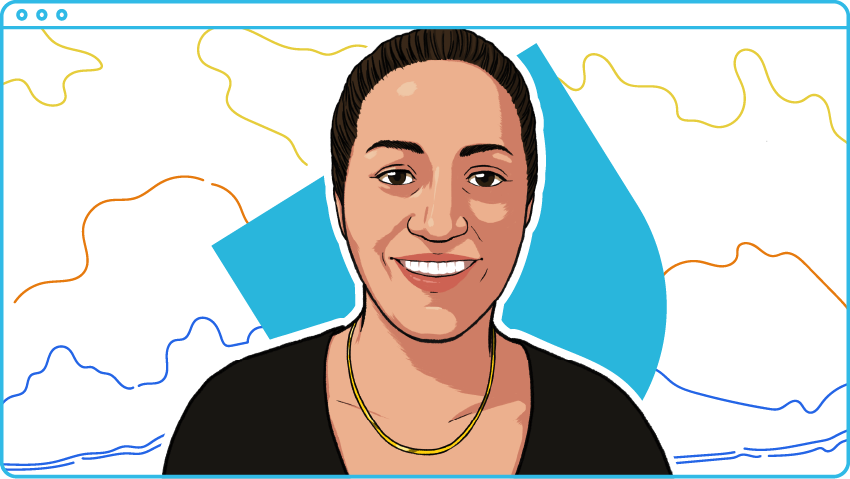
WKO: Let’s dig into your personal journey with Metrix. You started as an employee, and then you left and came back in more of an executive role, took over as CEO, and then you made the decision to purchase the business. Can you take me through that story?
JK: What a journey! When I started out at Metrix, it was very early in my career — I think the second job I ever had. I came in as a medical writer, not even knowing what instructional design was. I had no plan for my career and was really just trying to follow my interests and discover what I would like to do. I fell into the industry, but it ended up being a great fit. I love consulting, I love working with clients, I love solving problems, I love design, I love learning for its own sake. I ended up continuing for nearly ten years, and then I left to do a tech start-up.
The start-up didn’t go the way I had imagined, so I came back for what was supposed to be a short stint. The owner at the time was thinking about her own retirement and succession, so I came back to help her get the company ready for acquisition. And then we went on a journey. We explored quite a few avenues, and then we started talking about what it would look like if I were to purchase the company. Those discussions and that process took a long time. Some of that was on my end, figuring out the right way to approach the investment. Some of that was on her end — I think anyone who has built a business from the ground up takes a while before they feel really ready to sell. I wasn’t sure if it was going to work, but I was already in the CEO role, and it so happened I was pregnant. I think the birth of my child gave us a bit of a deadline, and we made it happen.
Thinking back to when I started, never in my life would I have thought of myself as a business owner. It was something that developed from being in a place where I loved the work and I loved the company, and I got to know its operations and realized that not only was it something I could do, but it was something I was excited about doing. It was also a bit of luck, being in the right place at the right time, with a solution that could help somebody.
The previous owner and I still talk all the time. And I think we’re both proud of how her legacy is living on in a way that feels really good for both of us.
WKO: You took over the business at the same time you had a baby, so you have a preschooler now. How have you blended business ownership with parenting?
JK: I think my son was eight or nine months when COVID happened, so it was shortly after I was back at work. I think that created a very different experience as a parent. Instead of commuting into an office every day, I felt more able to spend time with my child. I think my goal is always to spend as much quality time with him as I can. As a parent, I do feel more limited in what I’m able to do for work. Kids sometimes just need your attention, and you don’t get to choose when that happens.
They always say parents become hyper-organized with their time, because you don’t have the luxury of catching up later. I can do work after he goes to bed, and I often do. But there’s only so much energy left at the end of the day. I would actually love to work a full Saturday, and feel caught up on the stuff I don’t get to do during the week. Now, if I work on the weekends, it’s always piecemeal — an hour here, half-an-hour there. Maybe that will come when my child is more independent and I can have that dedicated time.
WKO: You mentioned COVID being a beneficial shift for you as a parent, but I’m curious if the pandemic has had other effects on your approach to running the business?
JK: Definitely. COVID happened about eight months after I took over as owner. It was definitely my first large business challenge, to put it mildly. I remember feeling an incredible amount of stress from the uncertainty. I remember worrying about whether all our clients were going to pull their business. We had all kinds of contingency plans, but we didn’t end up needing them: from a business perspective, we were totally fine. The challenge ended up being around team mental health. There was a lot of stress in the broader world, and we were really trying to manage through that.
I remember looking around at everything that was happening in the world and feeling a lot of stress — just as a human being, never mind a business owner. For myself, I was able to get more in touch with the human side of leadership. It has changed my approach.
More tactically, we’ve gotten rid of our office space and are experimenting with a completely remote culture. Before COVID happened, we allowed people to be remote when they needed to be, but Metrix was still very much an in-person culture.
When things started opening up again, we left people to their own devices in terms of whether they wanted to come in or stay home, but we did try a variety of things to entice people back to the office. We organized a few dedicated in-office days, thinking some people might like to come in, but they don’t want to show up to an empty office. It was not very popular, I have to say. It was usually a few people from the leadership team, our HR person, and one or two other people. Ultimately, I am a big believer in empowering people to work in the way that they want, so we really started to question why we have office space.
There’s a lot of value from in-person meetings. You can get a lot done, and we encourage being in-person with clients where possible. But there are all sorts of ways you can book meeting rooms on-demand now, so we’re going to try a year being completely remote, and then reassess at the end. It’s a lot easier to get into a lease than to get out of one!

WKO: You have been very intentional in thinking about new offerings and business models, alongside professional services. I’d love for you to walk me through that.
JK: We started thinking about expanding our offering, in part because as an agency there are always ups and downs, and it would be nice to create different revenue streams. But primarily, we were looking for opportunities where we can really add value. Metrix has been in business for over thirty years. We have so much organizational knowledge about learning and skill development in the workplace. How might we use that to make a bigger impact?
We’ve built out a program called Huugo, where we looked at the some of the pain points that underly career exploration and development. So much of skill development is connected to your current job, your next job. Is there a way to connect more dots and really empower people to develop their own skills?
Huugo is how we have tackled that challenge. It’s a human-centric approach to career development and skill building. We piloted it as a direct-to-consumer service, and we’ve started looking at how corporate clients can use it for their employees, to help them move away from a model of assigning five mandatory modules or whatever.
It’s been an interesting exercise in understanding the market. We built Huugo with the consumer in mind, but we’ve had to adjust some of the features to help it resonate with corporate clients. We’re continuing to pursue the consumer version as well, because I think there is a good opportunity there.
WKO: You had a two-year stint with a tech start-up. How has that informed your approach to Huugo?
JK: The start-up came out of some graduate work at OCAD. Through that, we joined an incubator and I joined a program called SheEO for women-led businesses. I learned all kinds of principles and frameworks that I’ve taken back to Metrix. It’s definitely different running a mature business, but I think that experience gave me the added confidence to try new things.
In some ways, it’s much easier to create a new product when you have an established business, because you have money you can invest. With start-ups, cashflow is the hardest thing. I saw so many people living off their last paycheque from six months ago. In other ways, it’s really difficult to add a new business model to an existing entity. Finding bandwidth for the team to work on it has been a challenge. In an agency, people get pulled in every direction and it’s difficult to carve out time. You have to change your organizational DNA to really think about a new way of working.
WKO: You think carefully about how to pay people fairly within the context of professional services. How has that manifested in practical steps for your organization.
JK: My philosophy is always to give people as much as you possibly can. At the same time, as a business owner, you need to think about business continuity and sustainability. If you have a bad year, does the compensation model still work? We instituted a light profit-sharing model to help with that. I really believe in sharing the success of the company, and in doing everything you can to avoid layoffs. Those two ideas are a check-and-balance on each other. I’m also really attracted to models where employees hold significant equity.
I would also say that salary expectations have radically changed from just a few years ago. I completely understand, because I know the cost of living is so high, particularly in Toronto. You see tech companies who are getting a lot of venture capital, and they are paying such high salaries. Granted, they are in a highly competitive market for talent, but they also have no fiscal requirement to be profitable at the end of the year. They are trying to scale rapidly, and that’s the model, but it often ends up in mass layoffs. It’s a very different mindset. For me, having a stable company is the priority.
WKO: How do you define success? And how is that different for Metrix versus Jessica?
JK: Metrix has a ten-year growth plan. We want to be recognized as one of the leading learning and marketing agencies in North America. Right now, we have fairly good brand recognition in Canada, and we have specific growth targets for different customer segments, especially in the US. Ultimately, success for Metrix boils down to two things: a sustainable, healthy business, and one where we are making a tangible impact on our industry.
Success for myself — funnily enough, I don’t spend too much time thinking about that. Intuitively, I know success is about relationships. I love family and friends, and I want to make sure I cultivate those, and not be someone who drops relationships for work. Everyone goes through phases where they have to focus a little more in certain places. I don’t always feel like I’m doing a great job in living up to that value. But ultimately success is having a rich life at work and a rich life in my personal relationships.
Our other ideas worth exploring
“I want to hang my hat on me”
Krista Lee Hynes, co-founder and managing partner at Ignite Financial, talks about her journey from theatre to financial planning, and why she has always bet on herself.
A new comfort zone
Shiri Levy, co-founder and Chief Scientific Officer at Histone Therapeutics, talks about building a biotech to bring a genetic medicine to market.
Running shoes designed for women
Lindsay Housman, CEO of Hettas, talks about researching and designing a running shoe specifically for women, along with her philosophy on flexible work, and the challenges of fundraising as a female founder.

